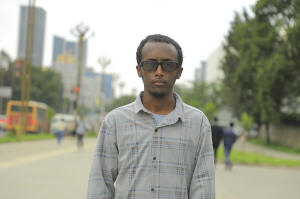Harvard files legal challenge over Trump's ban on foreign students.
Overseas, admitted students wait
[June 06, 2025]
By ANNIE MA, AMANUEL BIRHANE and FU TING
Winning admission to Harvard University fulfilled a longtime goal for
Yonas Nuguse, a student in Ethiopia who endured a war in the country's
Tigray region, internet and phone shutdowns, and the COVID-19 pandemic —
all of which made it impossible to finish high school on time.
Now, it’s unclear if he will make it this fall to the Ivy League campus
in Cambridge, Massachusetts. He and other admitted students around the
world are anxiously tracking the school's feud with the Trump
administration, which is seeking to keep it from enrolling international
students.
On Thursday, Harvard challenged President Donald Trump's latest move to
bar foreign students from entering the U.S. to attend the college,
calling it illegal retaliation for Harvard’s rejection of White House
demands. In an amended lawsuit filed Thursday, Harvard said the
president was attempting an end-run around a previous court order.
A few hours later, U.S. District Judge Allison Burroughs issued a
temporary restraining order against Trump's Wednesday proclamation,
saying Harvard had demonstrated “it will sustain immediate and
irreparable injury before there is an opportunity to hear from all
parties.”
Last month, a federal judge blocked the Department of Homeland Security
from revoking Harvard’s certification to host foreign students.

Admission to Harvard, then months of uncertainty
Increasingly, the nation’s oldest and best-known university has
attracted some of the brightest minds from around the world, with
international students accounting for one-quarter of its enrollment. As
Harvard’s fight with the administration plays out, foreign students can
only wait to find out if they'll be able to attend the school at all.
Some are weighing other options.
For Nuguse, 21, the war in Ethiopia forced schools to close in many
parts of the province. After schooling resumed, he then took a gap year
to study and save money to pay for his TOEFL English proficiency test in
Addis Ababa, Ethiopia’s capital.
“The war affected me a great deal and when I found out the news that I
was accepted to Harvard, I was ecstatic. I knew it was a proud moment
for my family, teachers, mentors and friends, who were instrumental in
my achievement,” he said.
The following months have been filled with uncertainty. On Wednesday,
Trump signed a directive seeking to block U.S. entry for Harvard's
international students, which would block thousands who are scheduled to
come to the campus in Cambridge, Massachusetts, for summer and fall
terms.
Harvard's court challenge a day later attacked Trump’s legal
justification for the action — a federal law allowing him to block a
“class of aliens” deemed detrimental to the nation’s interests.
Targeting only those who are coming to the U.S. to study at Harvard
doesn’t qualify as a “class of aliens,” Harvard said in its filing.
“The President’s actions thus are not undertaken to protect the
‘interests of the United States,’ but instead to pursue a government
vendetta against Harvard,” the university wrote.
In the meantime, Harvard is making contingency plans so students and
visiting scholars can continue their work at the university, President
Alan Garber said in a message to the campus and alumni.
“Each of us is part of a truly global university community,” Garber said
Thursday. “We know that the benefits of bringing talented people
together from around the world are unique and irreplaceable.”

[to top of second column]
|

Yonas Nuguse, 21 years old, destined for Harvard University pose for
a photo in Addis Ababa, Ethiopia Friday, May 30, 2025. (AP Photo/Amanuel
Birhane)

Crackdown on international students affects interest in the US
The standoff with Harvard comes as the administration has been
tightening scrutiny of student visas nationwide. Thousands of
students around the country abruptly lost permission to be in the
U.S. this spring before the administration reversed itself, and
Secretary of State Marco Rubio announced last week the U.S. would
“aggressively revoke” visas for students from China.
While many admitted students say they're waiting to find out if they
can come to the U.S., prospective students still in high school are
starting to look elsewhere, said Mike Henniger, CEO of Illume
Student Advisory Services.
“It is one blow after another,” said Henniger, who works with
colleges in the U.S., Canada and Europe to recruit international
students. “At this point, international student interest in the U.S.
has basically dropped to nil.”
The future of Harvard's roughly 7,000 international students has
been hanging in the balance since the Department of Homeland
Security first moved to block its foreign enrollment on May 22.
For many, the twists and turns have been exhausting. Jing, a
23-year-old master’s student, is currently completing an internship
in China this summer, and unsure if he can reenter the U.S. for the
fall semester.
“It is tiring, we all feel numb now. Trump just makes big news
headlines once every few days since he got back to the White House,”
said Jing, who agreed to speak under his family name out of concern
about retaliation from the Trump administration.
Jing said he is going to watch and see what happens for now, in case
the move against international students is a negotiating tactic that
does not stick.
The possibility that Trump could block foreign enrollment at other
colleges only raises the uncertainty for students planning to pursue
their education overseas, said Craig Riggs, who has been working in
international education for about 30 years and is the editor of ICEF
Monitor. He said he urges families to consult carefully with
advisers and not to overreact to the day's headlines.

“The rules under which students would make this huge decision to
devote years of their lives and quite a bit of money to studying at
Harvard have been shown to change quite quickly,” Riggs said.
An aspiring economist, Nuguse was the only student accepted to
Harvard this year from Kalamino Special High School, which caters to
gifted students from underprivileged backgrounds from across Tigray.
After receiving acceptances also to Columbia University and Amherst
College, Nuguse chose Harvard, which he had long dreamed of
attending. He said he hopes it will work out to attend Harvard.
Nuguse was granted a visa to study at Harvard, and he worries it
might be too late to reverse his decision and attend another
university anyway. He received an email from Harvard last week,
telling him to proceed with his registration and highlighting a
judge’s order in Harvard's favor in the dispute over foreign
enrollment.
“I hope the situation is temporary and I can enroll on time to go on
and realize my dream far from reality in Ethiopia,” he said.
___
Associated Press writers Collin Binkley, Jocelyn Gecker and Cheyanne
Mumphrey contributed to this report.
All contents © copyright 2025 Associated Press. All rights reserved |